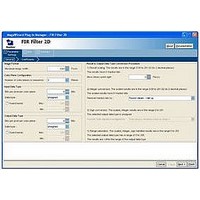IPS-VIDEO Altera, IPS-VIDEO Datasheet - Page 161

IPS-VIDEO
Manufacturer Part Number
IPS-VIDEO
Description
MegaCore Suite W/ 17 DSP Video/image Processing Functions
Manufacturer
Altera
Type
-r
Specifications of IPS-VIDEO
Software Application
IP CORE, SUITES
Supported Families
Arria GX, Cyclone II, HardCopy II, Stratix II
Core Architecture
FPGA
Core Sub-architecture
Arria, Cyclone, Stratix
Rohs Compliant
NA
Function
Suite of IP Functions for Video and Image Processing
License
Initial License
Lead Free Status / RoHS Status
na
Lead Free Status / RoHS Status
na
- Current page: 161 of 214
- Download datasheet (6Mb)
Chapter 5: Functional Descriptions
Stall Behavior and Error Recovery
May 2011 Altera Corporation
Scaler II
■
Error Recovery
On receiving an early endofpacket signal, the Scaler stalls its input but continues
writing data until it has sent an entire frame. If it does not receive an endofpacket
signal at the end of a frame, the Scaler discards data until the end-of-packet is found.
In the Scaler II MegaCore function, the ratio of reads to writes is proportional to the
scaling ratio and occurs on both a per-pixel and a per-line basis. The frequency of lines
where reads and writes occur is proportional to the vertical scaling ratio. For example,
scaling up vertically by a factor of 2 results in the input being stalled every other line
for the length of time it takes to write one line of output; scaling down vertically by a
factor of 2 results in the output being stalled every other line for the length of time it
takes to read one line of input.
In a line that has both input and output active, the ratio of reads and writes is
proportional to the horizontal scaling ratio. For example, scaling from 64×64 to
128×128 causes 128 lines of output, where only 64 of these lines have any reads in
them. For each of these 64 lines, there are two writes to every read.
The internal latency of the Scaler II depends on the scaling algorithm and whether any
run time control is enabled. The scaling algorithm impacts stalling as follows:
■
■
Enabling run-time control of resolutions affects stalling between frames:
■
■
Error Recovery
On receiving an early endofpacket signal, the Scaler stalls its input but continues
writing data until it has sent an entire frame. If it does not receive an endofpacket
signal at the end of a frame, the Scaler discards data until the end-of-packet is found.
Enabling run-time control of coefficients adds a constant delay of about 20 cycles
plus the total number of coefficients to be read. For example, 16 taps and 32 phases
in each direction would add a delay of 20 + 2(16 × 32) = 1024 cycles.
In bilinear mode, a complete line of input is read into a buffer before any output is
produced. At the end of a frame there are no reads as this buffer is drained. Exactly
how many writes are possible during this time depends on the scaling ratio.
In polyphase mode with N
buffers before any output is ready. As with bilinear mode, there is a scaling ratio
dependent time at the end of a frame where no reads are needed as the buffers are
drained.
With no run-time control, there are about 10 cycles of delay before the behavior
described in the previous list begins, and about 20 cycles of further stalling
between each output line.
Enabling run-time control of resolutions adds about 25 cycles of delay between
frames.
v
vertical taps, N
v
– 1 lines of input are read into line
Video and Image Processing Suite User Guide
5–77
Related parts for IPS-VIDEO
Image
Part Number
Description
Manufacturer
Datasheet
Request
R

Part Number:
Description:
CYCLONE II STARTER KIT EP2C20N
Manufacturer:
Altera
Datasheet:

Part Number:
Description:
CPLD, EP610 Family, ECMOS Process, 300 Gates, 16 Macro Cells, 16 Reg., 16 User I/Os, 5V Supply, 35 Speed Grade, 24DIP
Manufacturer:
Altera Corporation
Datasheet:

Part Number:
Description:
CPLD, EP610 Family, ECMOS Process, 300 Gates, 16 Macro Cells, 16 Reg., 16 User I/Os, 5V Supply, 15 Speed Grade, 24DIP
Manufacturer:
Altera Corporation
Datasheet:

Part Number:
Description:
Manufacturer:
Altera Corporation
Datasheet:

Part Number:
Description:
CPLD, EP610 Family, ECMOS Process, 300 Gates, 16 Macro Cells, 16 Reg., 16 User I/Os, 5V Supply, 30 Speed Grade, 24DIP
Manufacturer:
Altera Corporation
Datasheet:

Part Number:
Description:
High-performance, low-power erasable programmable logic devices with 8 macrocells, 10ns
Manufacturer:
Altera Corporation
Datasheet:

Part Number:
Description:
High-performance, low-power erasable programmable logic devices with 8 macrocells, 7ns
Manufacturer:
Altera Corporation
Datasheet:

Part Number:
Description:
Classic EPLD
Manufacturer:
Altera Corporation
Datasheet:

Part Number:
Description:
High-performance, low-power erasable programmable logic devices with 8 macrocells, 10ns
Manufacturer:
Altera Corporation
Datasheet:

Part Number:
Description:
Manufacturer:
Altera Corporation
Datasheet:











